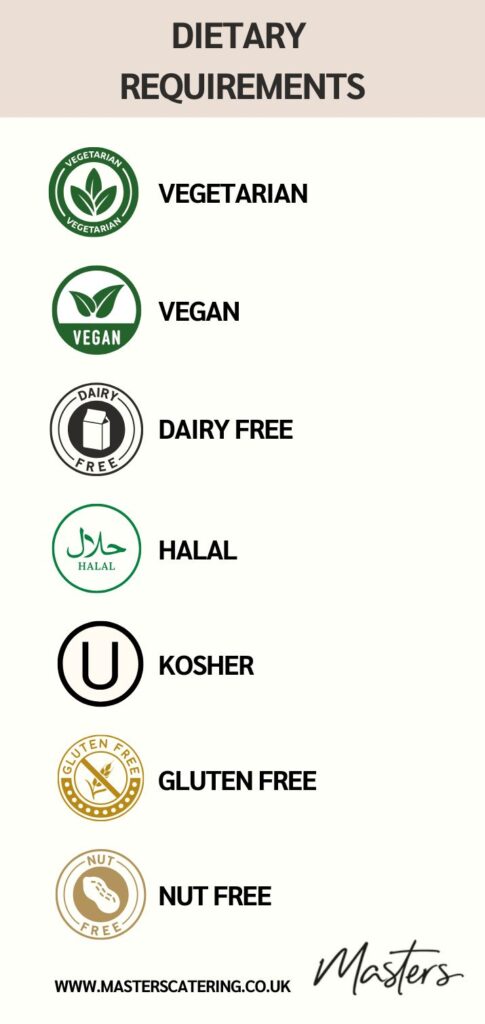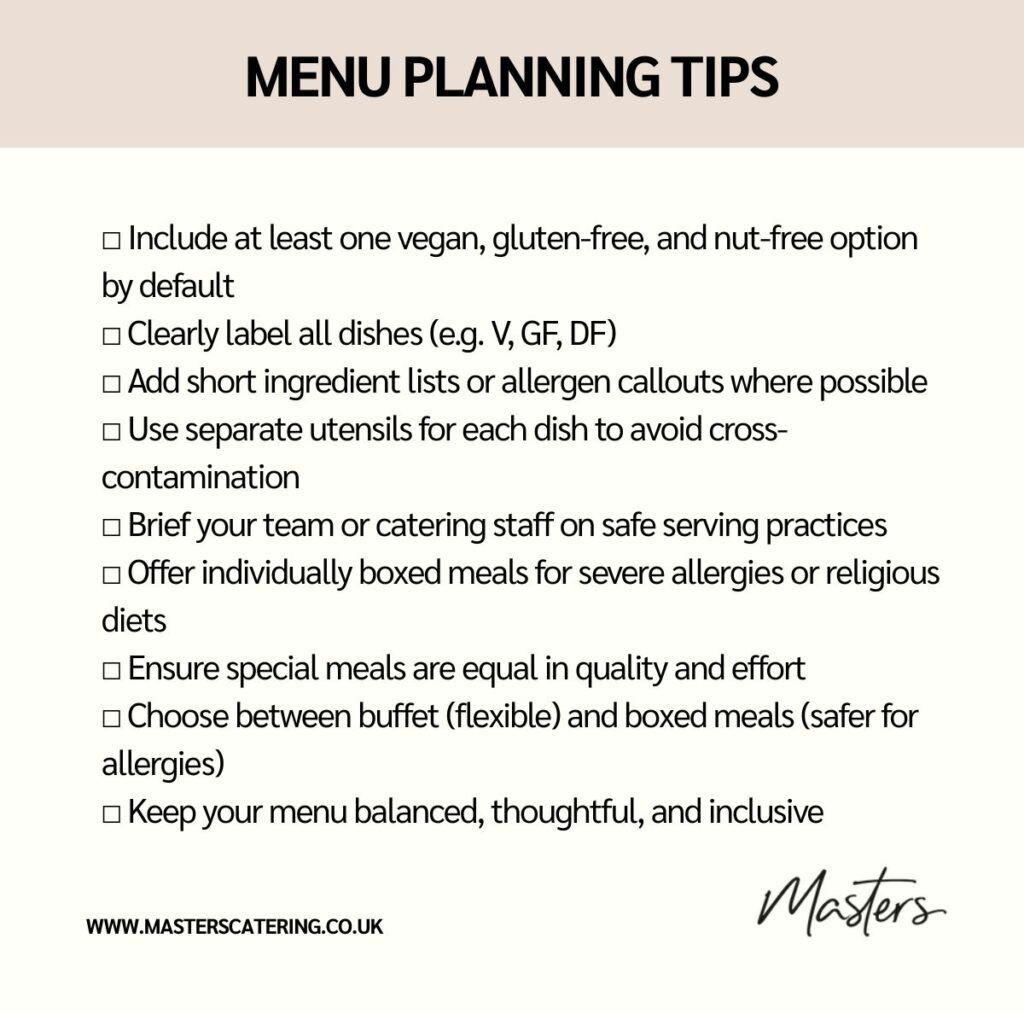Office Catering for Special Diets: How To Get It Right (Without the Stress)
Office catering can bring a team together… unless someone’s left out because their dietary needs weren’t considered.
Whether you’re planning a weekly team lunch, catering for a conference, healthcare catering or a one-off corporate event, getting it right isn’t just about avoiding issues, it’s about making everyone feel included.
We brought you the complete guide to office catering, and now our next guide breaks down the key diets to watch for, how to collect dietary info without the awkwardness, and what to look for when choosing a caterer that can handle it all.
Let’s make catering more inclusive and less stressful.
The first thing you need to do is to plan for common diets.
Common Special Diets You Need to Plan For
You don’t need to accommodate every diet, but there are a few that show up consistently in most workplaces. Planning for these upfront helps avoid last-minute stress and ensures no one’s stuck with a side salad while everyone else eats.
Here are the main ones to keep on your radar:
- Vegetarian – No meat, poultry, or fish. Most vegetarians still eat dairy and eggs.
- Vegan – No animal products at all. That means no meat, fish, dairy, eggs, or honey.
- Gluten-Free – Avoids wheat, barley, and rye. Some people have celiac disease, while others are gluten-sensitive.
- Dairy-Free / Lactose Intolerant – No milk, cheese, butter, or cream. Vegan options usually work, but double-check for sneaky ingredients.
- Nut-Free – Essential for allergy safety. Even trace amounts can trigger a reaction.
- Halal – Requires meat to be prepared a specific way and avoids pork and alcohol-based ingredients.
- Kosher – Follows Jewish dietary laws, with strict rules around meat and dairy separation and food prep.
It’s better to assume at least a few people in your office have one or more of these needs.
Planning with them in mind keeps things simple and respectful.

The next step is to collect dietary requirements from your team, without making it awkward.
How To Collect Dietary Requirements (Without Making It Awkward)
Most catering issues happen because no one asked the right questions early enough. Getting dietary info upfront doesn’t have to be a hassle. It just needs to be part of the process.
Here’s how to do it right:
- Keep it simple and inclusive
Avoid overly medical language. Instead of asking for “allergies or intolerances,” try:
“Do you have any dietary needs or preferences we should know about?”
This leaves space for both medical and lifestyle choices without putting anyone on the spot. - Use a short form or RSVP field
A quick Google Form, Slack poll, or event RSVP checkbox is all you need. For recurring lunches, save this info in a spreadsheet to avoid asking every time. - Give enough lead time
Don’t wait until the day before. Ask at least 3–5 days in advance so the caterer has time to prep properly. - Check in if you’re unsure
If someone lists “kosher,” “vegan,” or “severe allergy,” it’s okay to follow up for more detail. Clarifying now is better than guessing later.
A little effort here goes a long way, especially when it helps everyone feel considered and included.
To help you with this, here are questions you can put on the form:
Example Dietary Requirement Questions
What dietary needs or preferences should we know about?
This question is inclusive and low-pressure. It allows people to list allergies, intolerances, or lifestyle choices (like vegan or halal) without needing to categorize themselves too rigidly.
Do you have any food allergies or severe intolerances?
Call this out separately to help you flag higher-risk needs. Be sure to explain that this is for safety, not just preference tracking.
Do you follow a religious or cultural diet (e.g. Halal, Kosher)?
Including this shows that you’re thinking beyond just allergens—and that you want to respect everyone’s background.
Do you require a separate, individually packaged meal?
This question helps you plan for guests who may need additional precautions due to allergies, cross-contamination risks, or religious practices.
Once you’ve got a list of dietary requirements, it’s time to choose the best caterer.
Choosing the Right Caterer or Supplier
The next step is making sure your caterer can actually deliver.
You need to choose the best office catering supplier.
Not every food provider is equipped to handle special diets, so asking the right questions upfront matters.
Here’s what to look for:
- Clear experience with dietary accommodations
A good corporate caterer should be able to list which diets they can support—and how they prevent cross-contamination. If they can’t answer clearly, that’s a red flag. - Ingredient transparency
Menus should include clear labels for common allergens and dietary tags like “GF,” “DF,” or “V.” Bonus points if they provide full ingredient lists or allergen sheets. - Customizable or flexible menus
Look for vendors who can swap ingredients or build mixed platters that cater to multiple diets. Some will offer custom boxed meals for those with severe allergies or religious restrictions. - Communication is key
If a caterer is hard to reach, vague about ingredients, or dismissive of your questions, move on. You want a partner, not a gamble.
Planning for inclusivity starts with choosing the right team. And the right caterer makes everything that follows easier.
Incase you’re wondering, and you need a caterer that get’s all of this right, then why not choose us?
Masters Catering specializes in inclusive menus for modern workplaces—vegan, gluten-free, halal, kosher, allergy-friendly, and more.
✅ Clear labelling. ✅ Flexible options. ✅ No guesswork.
Now, we can get back to learning about special diets.
Menu Planning Tips
Once you’ve found a caterer who can handle special diets, the next step is building a menu that works for everyone, without making it overly complicated.
One that includes healthy snacks, and more alternatives than your average office potluck.
Start by planning for variety. Every menu should include at least one vegan, gluten-free, and nut-free option by default. This isn’t about going over the top; it’s about ensuring everyone has something they can safely enjoy without having to ask.
Make sure every dish is clearly labelled. Whether it’s a buffet or boxed setup, tags like V (vegan), GF (gluten-free), or DF (dairy-free) should be easy to spot.
Where possible, include a short ingredient list or allergen callout. For anyone with allergies, this can be the difference between eating comfortably and skipping the meal entirely.
When it comes to food safety, be strict about cross-contamination. If you’re doing a buffet, assign separate tongs to each dish and brief the staff on not mixing utensils.
For more control, especially with allergies or religious diets, individual boxed meals are often the better choice.
Don’t let special meals feel like an afterthought. It’s easy to fall into the trap of offering a plain salad while everyone else gets something exciting.
Put the same effort into every meal, regardless of who it’s for. If the main spread is colourful and well-balanced, the gluten-free or vegan option should be too.
Finally, think about how you’re serving the food. Buffets offer flexibility and encourage mingling, but they’re harder to manage from an allergy perspective. Boxed meals are safer and easier to track, especially for larger groups with diverse needs.
An inclusive menu doesn’t have to be complicated, it just needs to be intentional.

What to Watch For on the Day
The planning might be done, but the day-of execution is where things can fall apart if you’re not paying attention.
A few simple checks can make all the difference.
- Start by confirming that all labels are correct and clearly placed next to each dish. If you’ve taken time to request dietary tags and allergen notes, don’t assume they’ll be set up properly. Take a moment to double-check. This is especially important for dishes that look similar but serve very different dietary needs.
- Cross-contamination is another common pitfall. Make sure each dish has its own set of serving utensils, and if it’s a buffet, gently remind staff or attendees not to mix them. If you’re serving boxed meals, confirm that allergy-friendly or religiously specific options are sealed, labelled, and separated from the rest.
- It helps to assign one person, either someone on your team or a staff member from the catering company to oversee the food setup. Having a go-to point of contact ensures nothing gets missed and that any questions can be handled quickly without confusion.
- Finally, if you’ve requested anything specific, like a nut-free or kosher meal, physically check that it’s present and prepared correctly. These aren’t details you want to trust to chance.
Getting the small things right on the day shows that dietary needs weren’t just acknowledged.
They were respected throughout.
Post-Event Feedback
You’ve pulled off the catering.
Now’s your chance to learn what worked, and what to improve for next time.
Even a quick check-in can make a difference:
- Ask if everyone’s needs were met
A short post-event survey or casual follow-up lets people share if something was missed or could be better. It also shows you care beyond the event itself. - Track repeat requests
If you’re regularly ordering catering, keep a log of recurring dietary needs. That way, you’re not starting from scratch each time. - Use feedback to improve vendor relationships
If a caterer nailed it (or dropped the ball), let them know. It helps them improve—and helps you decide if you’ll work with them again.
Taking five minutes to gather feedback now saves you from making the same mistakes later.
Plus, it builds trust, people notice when you actually act on their input.
Final Thoughts: Make Inclusive Catering the Norm
Getting office catering right isn’t about going overboard, it’s about making people feel considered.
When you plan for special diets from the start, you’re not just avoiding awkward moments. You’re building a culture where everyone feels welcome at the table.
It doesn’t have to be complicated:
- Ask early
- Choose the right caterer
- Label clearly
- Follow up
Do that, and inclusive catering stops being an exception—it becomes your standard.
Need help planning your next team lunch or corporate event?
At Masters Catering, we specialize in office catering that works for everyone—vegan, gluten-free, halal, allergy-friendly, and everything in between. We’ll make sure your team is well-fed, safely served, and fully considered.
Get a quote today or explore our sample menus to see how easy inclusive catering can be.
Faisal is the head chef and founder of Masters Catering, but his love for cooking started long before the business ever did. After years spent working in some of London’s busiest kitchens, Faisal saw first-hand how good food has the power to bring people together, whether it’s over a team lunch or a big family celebration.
Today, he leads the team at Masters Catering, helping offices and event planners serve up food that’s fresh, generous, and actually gets people talking. When he’s not in the kitchen, Faisal loves sharing a little of what he’s learned from feeding thousands of people across London. On the blog, you’ll find practical tips on office catering, meal planning, and making food work better for busy teams.
